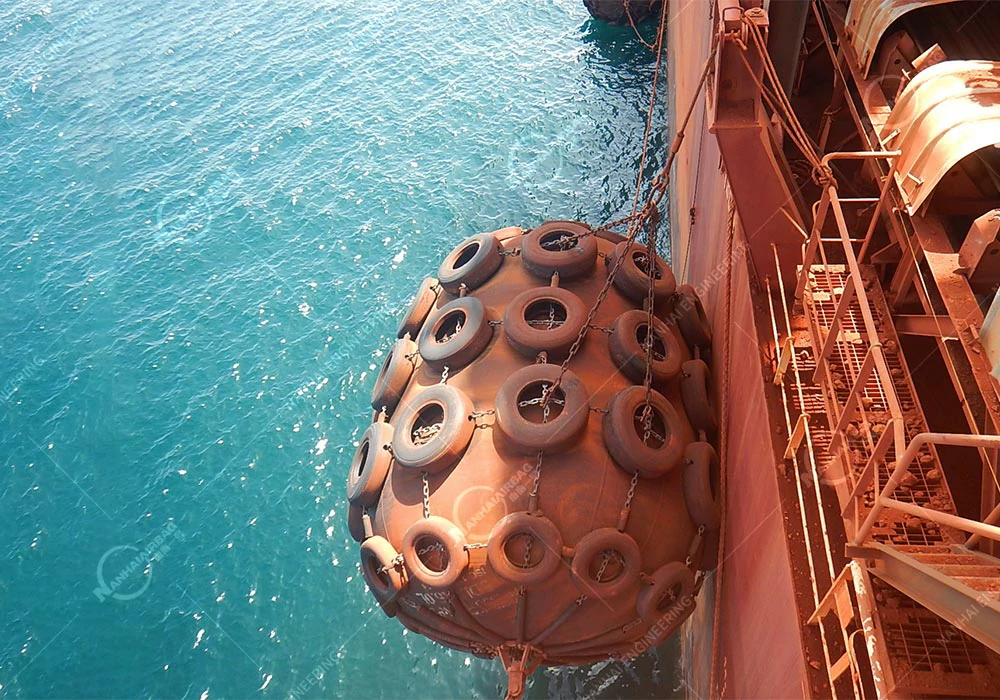2025 Marine Salvage Airbags New Upgrade
10/23/2025Rubber Dock Bumpers for Sale
10/27/2025What is a fender on a vessel?
When a vessel docks or pushes another ship, one small bump can cause big damage. A good vessel fender can save you thousands of dollars and keep your ship safe every day.
What Is a Vessel Fender?
A vessel fender is a rubber or foam bumper that’s installed on the outside of a ship’s hull.
It absorbs impact when the ship comes alongside a dock, barge, or another vessel.
By taking the shock, the fender protects the hull, paint, and structure from dents and cracks.
Main Types of Vessel Fenders
1. Rubber Fenders
Rubber fenders come in block or U-type shapes.
They are widely used on tugboats, workboats, and service vessels.
These fenders have strong resistance to wear and compression, perfect for frequent docking and pushing operations.

2. Foam-Filled Fenders
Foam fenders are light, solid, and need no air pressure.
They float easily, handle impacts well, and require no maintenance.
They are common on supply vessels, support ships, and passenger vessels.
Their outer polyurethane skin resists cracks, while the inner foam absorbs energy safely.

3. Pneumatic Rubber Fenders
Pneumatic rubber fenders are air-filled and float on the water surface.
They are mainly used during ship-to-ship (STS) or ship-to-dock (STD) operations.
Because they are filled with compressed air, they provide excellent energy absorption while staying lightweight and flexible.
They can adjust to different contact angles and sea levels, which makes them ideal for large vessels, offshore platforms, and emergency support ships.
Many owners also keep portable pneumatic fenders on board for temporary docking or salvage operations.
Their ability to absorb shock and reduce impact damage makes them one of the most trusted fenders in the marine industry.

4. Customized Vessel Fenders
Some ships need special fenders to fit curved hulls or unique operating conditions.
Custom fenders can be made in different sizes, hardness, and mounting styles—bolted, welded, or hung.
Why Vessel Fenders Matter
A good fender:
- Absorbs impact when docking or pushing.
- Protects the hull, cargo, and equipment.
- Improves safety for crew and operations.
- Extends vessel life and lowers maintenance costs.
In short, fenders are a small investment that prevent big repairs.
How to Install Fenders on a Vessel
Fenders are usually mounted along the sides, bow, and stern—where contact is most likely.
They can be bolted, welded, or hung using brackets or chains.
Each fender must fit tightly to the hull curve and not block ropes, ladders, or deck work.
After installation, crews should perform a short docking test to ensure the fenders stay firm and aligned.
Fender Maintenance for Crew Members
Fenders need care just like any other ship part.
Here’s how your crew can keep them in top shape:
- Inspect after every docking for cracks, deep wear, or loose fittings.
- Rinse with fresh water to remove salt and dirt.
- Avoid strong chemicals when cleaning.
- Check foam fenders for damage or water entry.
- Replace if the rubber is deformed, peeling, or too worn.
- Keep records in your ship’s maintenance log.
Why Choose NANHAI Vessel Fenders
At NANHAI, we’ve upgraded our rubber compound to make our fenders 100% more wear-resistant.
They stay flexible even in –50 °C conditions, perfect for cold or rough marine environments.
We design and manufacture fenders for tugboats, workboats, supply vessels, and offshore ships around the world.
What you get from NANHAI:
- Long-life, heavy-duty fenders.
- Customized designs for any vessel.
- Fast global delivery and technical support.
- Factory testing and quality assurance.
Our goal is simple: to keep your vessel safe and your operations running smoothly.
FAQ
Q: How often should I replace vessel fenders?
A: Usually every 2–5 years, depending on wear and usage.
Q: Where should fenders be installed?
A: Along the sides, bow, and stern—where the hull may touch other objects.
Q: Can your fenders work in extreme cold?
A: Yes, NANHAI’s upgraded rubber fenders perform well down to –50 °C.
Q: Do you offer installation help?
A: Yes, we provide remote and on-site technical guidance.
Final Thoughts
A reliable fender protects not only your ship but also your investment.
Choose a fender built to last—choose NANHAI.
Contact us today to get a custom fender solution designed for your vessel.
